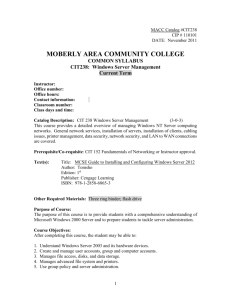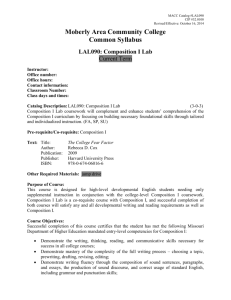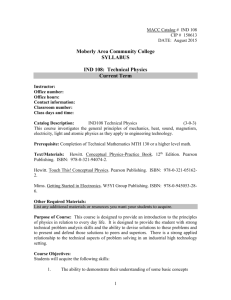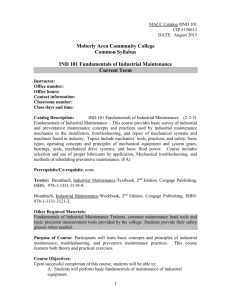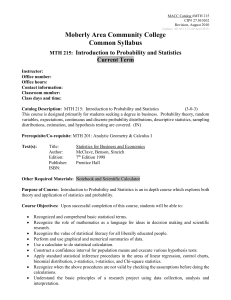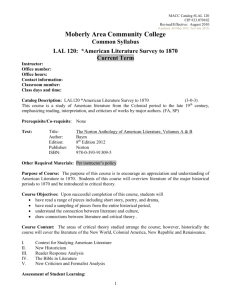BIO 206 Microbiology - Moberly Area Community College
advertisement
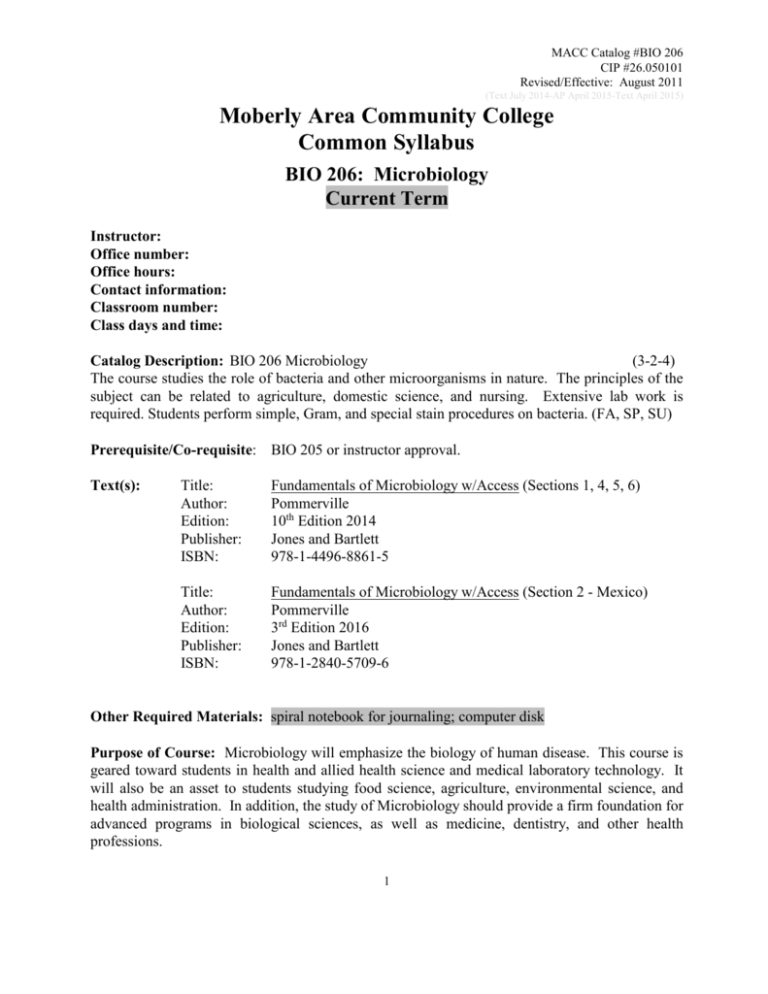
MACC Catalog #BIO 206 CIP #26.050101 Revised/Effective: August 2011 (Text July 2014-AP April 2015-Text April 2015) Moberly Area Community College Common Syllabus BIO 206: Microbiology Current Term Instructor: Office number: Office hours: Contact information: Classroom number: Class days and time: Catalog Description: BIO 206 Microbiology (3-2-4) The course studies the role of bacteria and other microorganisms in nature. The principles of the subject can be related to agriculture, domestic science, and nursing. Extensive lab work is required. Students perform simple, Gram, and special stain procedures on bacteria. (FA, SP, SU) Prerequisite/Co-requisite: BIO 205 or instructor approval. Text(s): Title: Author: Edition: Publisher: ISBN: Fundamentals of Microbiology w/Access (Sections 1, 4, 5, 6) Pommerville 10th Edition 2014 Jones and Bartlett 978-1-4496-8861-5 Title: Author: Edition: Publisher: ISBN: Fundamentals of Microbiology w/Access (Section 2 - Mexico) Pommerville 3rd Edition 2016 Jones and Bartlett 978-1-2840-5709-6 Other Required Materials: spiral notebook for journaling; computer disk Purpose of Course: Microbiology will emphasize the biology of human disease. This course is geared toward students in health and allied health science and medical laboratory technology. It will also be an asset to students studying food science, agriculture, environmental science, and health administration. In addition, the study of Microbiology should provide a firm foundation for advanced programs in biological sciences, as well as medicine, dentistry, and other health professions. 1 MACC Catalog #BIO 206 CIP #26.050101 Revised/Effective: August 2011 (Text July 2014-AP April 2015-Text April 2015) Course Objectives: Upon successful completion of this course, students will: * Become familiar with medically important groups of microbes. * Learn methods to employ to retard microbial growth. * Recognize pathways which contagious diseases follow and stages of such diseases. * Identify the various defenses of the body against microbial infection. * Learn symptoms, causative agents, and results of contagious diseases associated with various organ systems. Course Content: I. History of Microbiology II. Molecular Biology (Chemistry, Inorganic and Organic) III. Characteristics of Life IV. Taxonomy and Modern Classification of Microorganisms V. Protozoa and Parasitic Protozoal diseases VI. Fungus, unicellular, dimorphic, and systemic VII. Algae, Unicellular and colonial. VIII. Virus, Retrovirus, Bacteriophage and the stages of replication within the cell IX. Bacterial morphology, anatomy, and special features X. Bacterial Metabolism, Aerobic, and Anaerobic Respiration XI. Bacterial Genetics, structure of genome. XII. Study of Pathogenic Bacteria, causative agents, symptoms, disease, toxins, immunization available. XIII. Physical and Chemical Control of microorganisms Assessment of Student Learning: Per instructor’s policy Description of Major Assignment(s)/Project(s): Microbiology Lab Experiments: 1. Compound Microscope, Basic Bacterial shapes and special features, 2. Study the morphology of Bacteria by Simple Staining 3. Principle of Gram Staining 4. Pond water physiology and the study of microorganism 5. Culture and Sensitivity (Streak Plate Method) 6. Spore staining by special stains 7. Negative and Capsule Stain 8. Physical and Chemical Control by “In Use” test and "Serial Dilution Method" 9. Effect of various chemicals on Bacteria Statement to Connect Course with General Education Outcomes or Technical Program Outcome Statement: In compliance with MACC's General Education Outcomes, the student who successfully completes this course will be able to: 2 MACC Catalog #BIO 206 CIP #26.050101 Revised/Effective: August 2011 (Text July 2014-AP April 2015-Text April 2015) Demonstrate effective written and oral communication skills. Demonstrate an understanding of scientific principles and computational skills and how to use them to solve problems and make informed decisions. Instructor Policies: Academic Dishonesty: MACC board policy is as follows: “Academic dishonesty by students damages institutional credibility and unfairly jeopardizes honest students; therefore, it will not be tolerated in any form.” Forms of academic dishonesty include but are not limited to the following: violations of copyright law, plagiarism, fabrication, cheating, collusion, and other academic misconduct. Incidents of dishonesty regarding assignments, examinations, classroom/laboratory activities, and/or the submission of misleading or false information to the College will be treated seriously. The procedure for handling academic dishonesty is outlined in the Student Handbook (Policy Handbook M.010). In cases of alleged academic dishonesty, the burden of proof is on the student, not on the instructor. Attendance Policy: Any student who misses two consecutive weeks of class during a regular sixteen-week semester or the equivalent proportion of class time during a shorter session will be dropped from the class by the instructor unless acceptable justification is supplied. An instructor must complete and file the appropriate forms to drop the student within one week following the student’s violation of the attendance policy. Additionally, any student who misses more than onefourth of the entire number of in-seat class meetings in a regular 16-week semester or the equivalent proportion of class time during a shorter session, may be dropped from that class by the instructor if, in the opinion of the instructor, the student does not have reasonable opportunity to succeed in the class. A student’s attendance rate will be calculated based upon the first day of the semester (not the student’s date of enrollment in the course.) Student attendance must be defined in a different manner for online, hybrid, and virtual courses. Student attendance in these courses is defined as active participation in the course. Online, hybrid, and virtual courses will, at a minimum, have weekly mechanisms for student participation, such as any or all of the following methods: a. Completion of quizzes or exams b. Submission of assignments c. Participation in threaded discussions d. Communication with the instructor A student who does not participate in an online, hybrid, or virtual course for two consecutive weeks will be dropped by the instructor unless acceptable justification is supplied. An instructor must complete and file the appropriate forms to drop the student within one week following the student’s violation of the attendance policy. As with ground courses, a student’s attendance rate in online courses will also be calculated based upon the first day of the semester. If a student does not demonstrate active participation in the online course within the first two weeks (or the 3 MACC Catalog #BIO 206 CIP #26.050101 Revised/Effective: August 2011 (Text July 2014-AP April 2015-Text April 2015) equivalent proportion of class time during a short session), the student will be dropped as “never attended.” Simply logging into an online class does not constitute active participation. Students should be aware that their dropping a course and their last date of attendance in the course may impact their financial aid. (Policy Handbook I.090 and M.095) Tardiness: Per instructor’s policy Make-up and late work: Per instructor’s policy Extra-credit work: Per instructor’s policy Schedule of Student Assignment and Activities: Per instructor’s policy ADA Statement Students who have disabilities that qualify under the Americans with Disabilities Act may register for assistance through the Office of Access and ADA Services. Students are invited to contact the Access Office to confidentially discuss disability information, academic accommodations, appropriate documentation and procedures. For more information, please call either the Moberly office at (660) 263-4100 x 11240 or the Columbia office at (573) 234-1067 x 12120, or visit our web page at http://www.macc.edu/index.php/services/access-office. Title IX Statement MACC maintains a strict policy prohibiting sexual misconduct in any form, including sexual harassment, sexual discrimination, and sexual violence. All MACC employees, including faculty members, are considered mandated reporters of sexual misconduct and as such are expected to contact the Title IX Coordinator when they become aware, in conversation or in writing, of an incident of sexual misconduct. For more information on this policy or to learn about support resources, please see http://www.macc.edu/sexual-misconduct-policy or contact Dr. Jackie Fischer, MACC’s Title IX Coordinator, at 660-263-4110, ext. 11236 or jackief@macc.edu. 4



